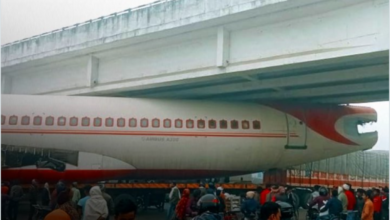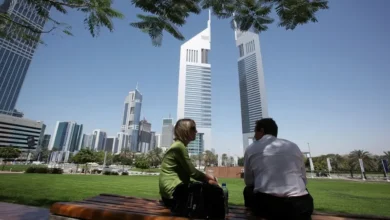Remote, flexible work to boost travel spending by UAE, Saudi travelers in 2023

Residents of the United Arab Emirates and Saudi Arabia will increase their travel spending in 2023 as the sector continues to experience a strong recovery post-COVID-19 largely driven by flexible and remote working options, an expert told Al Arabiya English on Tuesday.
Hospitality behemoth Marriott International found that 93 percent of people surveyed in both markets said they were planning to go on vacation, with around 66 percent saying they will be planning more breaks than in 2022.
“Travel trends for 2023 are more interesting than ever due to the unique situation we are in, as we look ahead to the way consumers plan to travel this year. What comes across very clearly is a resurgence in the sector based in large part on increased confidence amongst travelers, with most planning to spend more than last year and the demand for luxury with travelers in the UAE and Saudi Arabia remaining strong,” said Neal Jones, Chief Sales and Marketing Officer of Marriott International in Europe, the Middle East and Africa.
“This clearly shows great optimism, but also that people will be ring-fencing holiday spending.”
Some key travel trends expected to dominate the market, according to the hospitality group’s findings from research conducted by Marriott Bonvoy, include luxury accommodation, authentic travel, workations (also known as work away vacations) due to the rise of hybrid and remote work after the pandemic, and sustainability.
“We know that travel means so much more to people now. Beyond visiting destinations, travel can now be purposeful, educational, and regenerative. We’ve seen a continued trend in our guests’ desire to travel better – being more proactive, progressive, and wanting to affect positive change, and all the while still indulging in global exploration,” Jones told Al Arabiya English.
“Travelers are taking a more considered and intentional approach to where and how they travel. They want a deeper connection to the places they visit, getting to know the people, history, food, and the culture of a place. They’re shifting from a desire of being ‘well-travelled’ to ‘travelling well’.”
‘Authentic travel’
As more travelers seek out unique and meaningful experiences, the concept of authentic travel is gaining popularity. Authentic travel is all about immersing oneself in the culture and way of life of a destination, rather than simply viewing it as a tourist.
Authentic travel is becoming a more popular way for people to connect with their surroundings, past the preconceptions and stereotypes of tourism. It’s not only about luxury or exclusivity, but above all about having a meaningful and human experience of the place you are visiting.
Research showed that authentic travel will be a key emerging trend this year, with many wanting to immerse themselves in a complete change of culture. Over half of respondents in both markets the UAE (55 percent) and Saudi Arabia (56 percent) said they were hoping to explore new destinations and cultures.
“The freedom and flexibility of being able to live and work while traveling the globe is more appealing and achievable now than it was prior to the pandemic. With that, we are increasingly seeing the hotel becoming the destination, particularly in the luxury segment,” Jones explained.
“Guests used to see the hotel as the gateway for exploring and discovering a new locale, however guests now expect immersive experiences to take place at or arranged through the hotel, and our luxury brands are tapping into this trend, developing new and engaging programing to further embrace and highlight the destination through the offerings.”
‘Bleisure’ and ‘workations’
Jones also reported an increase in digital nomads seeking luxury “workation” experiences at Marriott hotels around the world.
“Flexible and remote working patterns are set to continue, Jones said. “We need to ensure that we can cater to changes in travel patterns where people look to blend work and leisure travel more or travel for extended periods.”
The world witnessed a seismic shift toward remote work in 2020, during the early days of the pandemic when the majority of the world was forced into lockdown. This shift has impacted the experience of the full-time employee, further boosting the global population of digital nomads – people who choose to embrace a location-independent lifestyle enabled by technology in order to travel the world and work remotely.
With the desire to roam the world now more than ever, digital nomads are still globetrotting post-COVID-19, resulting in an uptick in demand for travel.
The 2023 Marriott Bonvoy Travel Trends research reflects this – with 48 percent of those from the UAE and 44 percent from Saudi Arabia going on extended holidays, highlighting that being able to work remotely allows them to take a longer holiday without having to take annual leave for the whole break.
In fact, hybrid and remote working has had a significant impact on travel plans in 2023. Nearly a third of those from the UAE (31 percent) and 23 percent from Saudi Arabia plan to take a “work-away holiday” – where they will continue to log on and work whilst travelling, thus allowing them to experience a new place without taking annual leave.
Luxury travel
The Middle Eastern region has a long history of wealth and opulence, which is heavily reflected in the culture and lifestyle of many people. Luxury travel is seen as a way to indulge in the finer things in life and to enjoy the best that the world has to offer.
Booking data from Marriott Bonvoy reveals how resilient luxury demand in the Middle East is, with bookings from April this year for luxury properties up 13 percent compared to pre-pandemic levels.
“The collective mindset has changed from viewing travel as a luxury commodity to an activity vital to overall well-being,” said Jones.
“More than ever before, our luxury guests are prioritizing more meaningful travel and time spent with loved ones, looking for experiences that reflect their personal values and enhance their overall quality of life.”
Sustainability
Sustainability is now a key factor in many peoples’ travel plans, Marriott International found, with 85 percent in the UAE and 80 percent in Saudi Arabia saying that environmental considerations now have an impact on their arrangements.
“I’m delighted to see the priority that so many travelers are putting on sustainability, with most taking it into consideration and many shaping their holidays around this.”
Forty-three percent in the UAE go as far as to say environmental considerations define their travel plans and they will only spend money with companies that have a positive environmental impact, whilst the figure is 38 percent in Saudi Arabia.
Transportation, particularly air travel, is a major contributor to climate change. Greenhouse gas emissions from the aviation industry are a significant driver of global warming, and the industry is projected to account for an increasingly large share of total emissions in the coming years.
Air travel is a major source of pollution, particularly in terms of noise pollution, which can have a negative impact on the quality of life for people living near airports and it can also have a detrimental impact on wildlife and biodiversity, particularly in areas surrounding airports and flight paths.
Another reason why people may be considering the environmental impact of travel is the way in which tourism can contribute to the overconsumption of resources in destination areas. This can lead to the degradation of natural habitats, the displacement of local communities, and the depletion of water and other resources.










